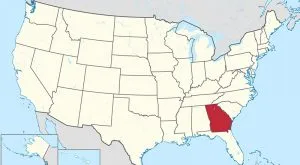Georgia, a southern state in the United States, is renowned not only for its diverse natural beauty—from the Appalachian Mountains to the Atlantic coast—but also as an attractive destination with a cost of living that is quite reasonable compared to many other major metropolitan areas in the US. If you are considering moving to Georgia or simply want to understand the budget needed for an extended trip, understanding the average cost of living in its major cities is crucial. This article will provide an overview and detailed insights into the cost of living in some of Georgia’s largest cities, helping you best prepare for your plans.

Overview of the Cost of Living in Georgia
Compared to other states nationwide, Georgia is generally considered to have a more affordable cost of living, particularly when it comes to housing. However, this cost can vary significantly depending on the city and area you choose to live in. Major cities like Atlanta and its surrounding suburbs tend to be more expensive than rural areas or smaller cities.
To better understand the average cost of living in Georgia’s major cities, we will focus on key factors such as housing, food, transportation, utilities, and other personal expenses.
Housing Costs in Major Georgia Cities
Housing often constitutes the largest portion of a monthly living budget. Below is an overview of average rental and home purchase costs in some of Georgia’s major cities:
Atlanta
Atlanta, the capital and largest city of Georgia, is a significant economic, cultural, and transportation hub in the Southeastern United States. Housing costs in Atlanta tend to be higher than the state average but are still competitive compared to other major cities nationwide.
- Apartment Rentals: Rent for a one-bedroom apartment in downtown Atlanta can range from $1,500 to $2,500 per month, while in the suburbs, prices may be lower, from $1,200 to $2,000.
- Home Purchase: The median home price in Atlanta varies by neighborhood but typically ranges from $400,000 to $800,000 or higher for upscale areas.
Savannah
Savannah, a historic city famous for its preserved architecture and Southern charm, has more affordable housing costs compared to Atlanta.
- Apartment Rentals: Rent for a one-bedroom apartment in Savannah can range from $1,200 to $1,800 per month.
- Home Purchase: The median home price in Savannah typically ranges from $300,000 to $500,000.
Augusta
Augusta, renowned for hosting the Masters Tournament golf event, is another major city in Georgia with a reasonable cost of living.
- Apartment Rentals: Rent for a one-bedroom apartment in Augusta can range from $900 to $1,500 per month.
- Home Purchase: The median home price in Augusta is generally lower than Savannah, ranging from $200,000 to $400,000.
Athens
Athens, a vibrant college town home to the University of Georgia, offers an affordable cost of living, especially for housing, due to its large student population.
- Apartment Rentals: Rent for a one-bedroom apartment in Athens can range from $800 to $1,400 per month, with many options catering to students.
- Home Purchase: The median home price in Athens is relatively affordable, typically ranging from $250,000 to $450,000.

Food and Dining Costs
Food costs in Georgia are on par with the national average. However, like housing, these costs can differ among major cities.
- Groceries: On average, a single person might spend about $300 to $400 per month on groceries in Georgia. This cost can be higher in Atlanta and other major metropolitan areas and lower in smaller cities or rural areas.
- Dining Out: Eating out at restaurants in Georgia offers options from casual to upscale. A meal at a casual restaurant might cost between $15 and $25, while a meal at a mid-range restaurant could range from $30 to $50 or more. Major cities like Atlanta have diverse dining options with varying price points.
Transportation Costs
Transportation costs in Georgia depend on whether you use public transportation or personal vehicles.
- Public Transportation: Atlanta has a public transportation system called MARTA, which includes subway and bus services, with a monthly pass costing around $95. Other cities like Savannah and Augusta have more limited public bus systems.
- Personal Vehicles: Owning and operating a car in Georgia includes expenses for gasoline, insurance, maintenance, and parking. Gas prices can fluctuate but are generally in line with the national average. Car insurance in Georgia can range from $100 to $200 per month, depending on age, driving history, and vehicle type.

Utilities and Services Costs
Utility costs in Georgia include electricity, water, gas, internet, and phone services.
- Monthly Utilities: On average, monthly utility costs for a one-bedroom apartment in Georgia can range from $150 to $250, depending on apartment size, usage, and season. Hot summers can increase electricity costs due to air conditioning use.
- Internet and Phone: Internet and phone service costs can range from $50 to $100 per month, depending on the service package you choose.
Healthcare Costs
Healthcare costs in Georgia are similar to the national average. However, health insurance costs can vary depending on age, health status, and the plan you choose.
- Health Insurance: Monthly health insurance premiums can range from $300 to $600 or higher for a single individual, depending on the type of coverage and level of benefits.
- Medical Visits and Prescriptions: Costs for doctor visits and prescriptions are also comparable to the national average.
Education Costs
Georgia has a diverse public and private education system.
- Public Education: Public education from kindergarten through high school is free for Georgia residents.
- Higher Education: The cost of higher education in Georgia varies depending on the institution and program. Public universities are less expensive for in-state residents, while private universities are more costly. (More details on higher education costs were mentioned in the original article).

Entertainment and Personal Expenses
Entertainment and personal expenses depend on individual lifestyles. Georgia offers a wide range of entertainment options, from historical sites, museums, parks to outdoor activities and cultural events.
- Entertainment: A budget for entertainment can range from $100 to $300 or more per month, depending on personal preferences.
- Other Personal Expenses: Other personal expenses may include clothing, personal care, gym memberships, and other services.
Summary Table of Average Monthly Living Costs in Major Georgia Cities (Estimated for a Single Person)
| City | Housing (1-Bedroom Apartment Rent) | Food | Transportation | Utilities | Total (Estimated) |
|---|---|---|---|---|---|
| Atlanta | $1,500 – $2,500 | $350 – $450 | $100 – $200 | $180 – $280 | $2,130 – $3,430 |
| Savannah | $1,200 – $1,800 | $300 – $400 | $80 – $150 | $150 – $250 | $1,730 – $2,600 |
| Augusta | $900 – $1,500 | $300 – $400 | $70 – $140 | $140 – $240 | $1,410 – $2,280 |
| Athens | $800 – $1,400 | $300 – $400 | $60 – $120 | $130 – $230 | $1,290 – $2,150 |
Note: These are estimated average living costs and can vary depending on many factors such as the specific location within the city, personal lifestyle, and market fluctuations.

Factors Affecting the Cost of Living in Georgia
Several factors can influence the cost of living in Georgia, including:
- Geographic Location: Major cities and metropolitan areas generally have higher living costs compared to rural regions.
- Local Economy: The economic conditions and job market of each city can affect salary levels and prices.
- Personal Lifestyle: An individual’s lifestyle, including housing choices, transportation methods, eating habits, and entertainment, will directly impact living expenses.
Tips to Save on Living Costs in Georgia
To reduce living costs in major Georgia cities, consider these tips:
- Choose Suitable Housing Areas: Consider renting or buying homes in suburban areas or smaller cities to reduce housing expenses.
- Cook at Home: Cooking meals at home regularly instead of eating out will significantly save on food costs.
- Use Public Transportation or Bicycles: If possible, use public transport or bicycles instead of personal cars to lower transportation costs.
- Save Energy: Use energy efficiently at home to reduce utility bills.
- Seek Free or Low-Cost Entertainment: Georgia offers many parks, museums, and free or low-cost events.
Conclusion
The average cost of living in Georgia’s major cities can vary significantly depending on the city you choose and your lifestyle. Atlanta is the most expensive among the cities mentioned, while Athens and Augusta offer more affordable living costs. Careful budget planning and thorough research into the cost of living in your city of interest will help you best prepare for life in Georgia. Hopefully, this article has provided you with a useful overview and insights into the cost of living in major Georgia cities.